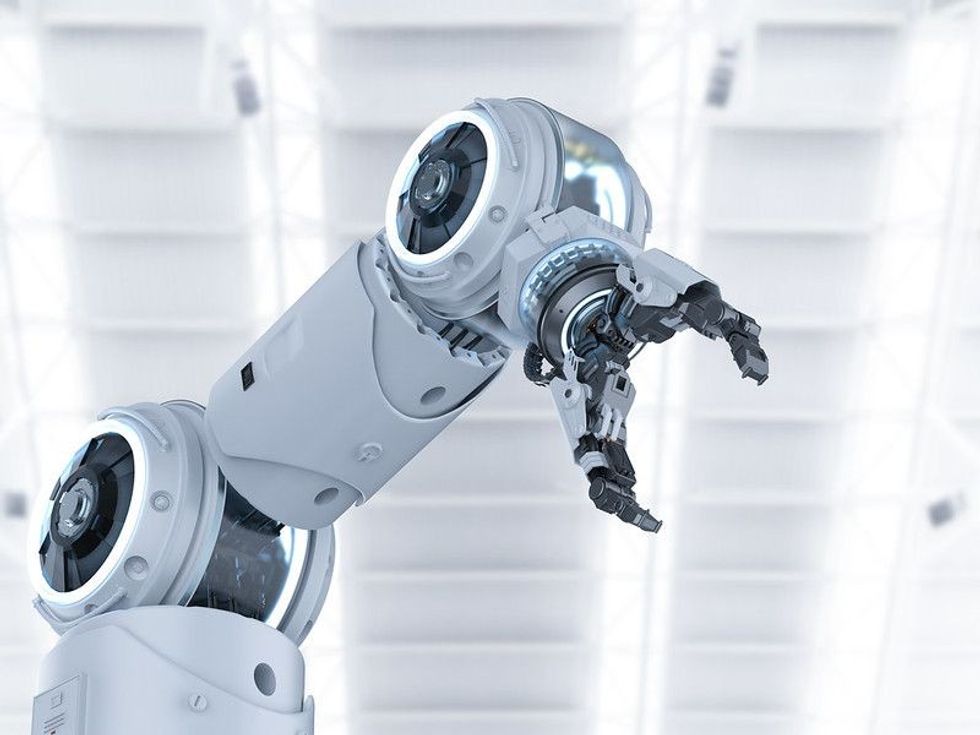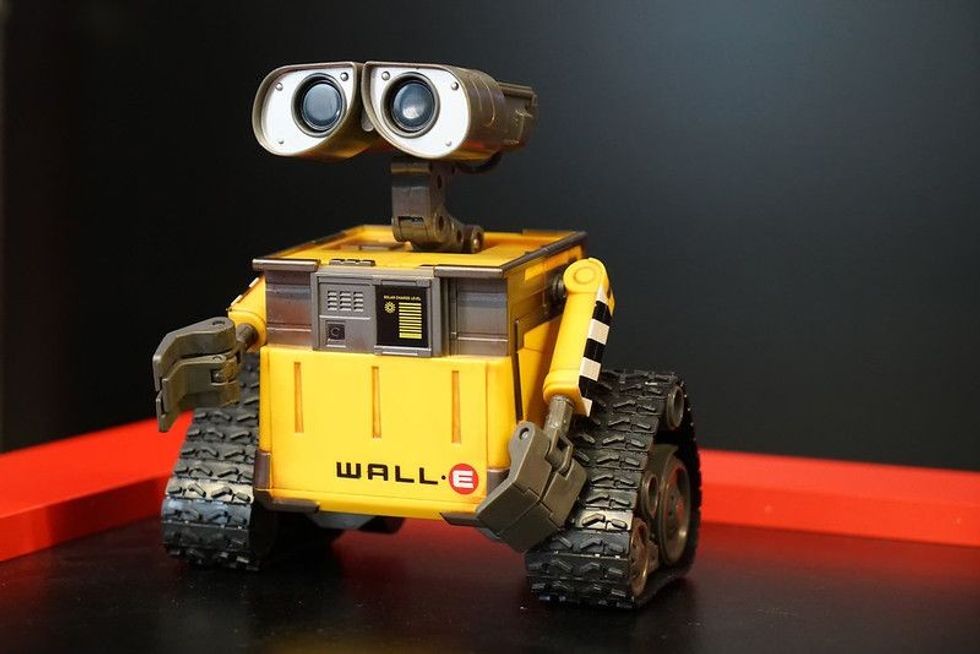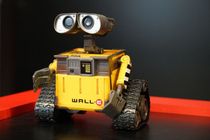Get To Know All About Robots: The Invention By Humans

Content
Emerging technologies are advancing rapidly and changing the world as a whole.
These advancements can work on extremely high speed, quality, and cost of merchandise and services and help workers perform dangerous tasks. Some consider it an advantage, and some think that technology will take away their jobs.
Today's economy is more interlinked, with the demands of the people, the technology around the world is advancing. There have been many technological advancements helping the manufacturing industry stay ahead of the game-Innovative machines that are more efficient.
From science to commerce, warfare, politics, and education, new technologies are emerging faster to test our knowledge and even direct and shape our society for good and evil.
Most innovation is, or in a roundabout way is, determined by new technology, new business development, and changing consumer behaviors. This changes our reality and different business sectors. In this manner, then, comprehension of innovation and its effect is essential to have the option to develop and to do it continually.
When new technology becomes set up in the general public, it drives new practices among individuals and their job as purchasers, and these new practices address expected new business sectors. Artificial intelligence is another trending technology that will open new markets and specialties.
If you enjoyed reading our article, you would also love to read about science facts and how long do human clones live?
Types
A robot is the result of the robotics field, in which the programmable machines are assembled that can help people or copy just like humans.
The industrial robot was initially built to deal with heavy tasks like building vehicles or any machinery work, yet they have since extended well past their underlying uses to perform errands like cleaning homes, battling fires, and helping with unimaginably perplexing medical surgeries.
The word robotics is an extension of the word robot, and robotics is referred to the science and study of robots.
Robotics deals with robot design, construction, operation, and robot use in automation. Some different types of robots are designed that assist humans in various tasks.
There is no doubt; robotics is changing the world. Machine manufacturers are always ready to get a robotic machine to change how they perform their tasks drastically.
Modern robots appear to be a present-day invention. Still, in actuality, proof proposes that robots were made for everything from toys to parts used in religious ceremonies in ancient Greece and Rome.
Leonardo da Vinci's designs for a humanoid robot in the last part of the 1400s is proof that robots were popular even during that era. Jacques de Vaucanson was well known in the 18th century for his human figure robot playing the flute and a duck that could fold its wings.
The world's first robot was made by George Devol and Joseph Engelberger in 1956. By the '60s, robots were brought into the General Motors vehicle plant in New Jersey for moving car parts around.
Over the years, engineers developed robots, and now you will find them in homes as toys, vacuum cleaners, and programmable pets. Today robots are a part of the industry, science, food packaging, medicine, space exploration, development, healthcare robots, and performing surgery (a surgical robot).
Mechanical robots come in different shapes and sizes to effectively do the task for which they are planned. All robots have different designs, control systems, functionality, and level of independence. So, the different types of robots are listed below:
The preprogrammed robots work in a controlled climate where they do tedious and simple tasks. An illustration of a preprogrammed robot would be a mechanical arm on an auto sequential construction system.
The arm serves to weld the door, embedding a specific part into the engine, and so forth, and its responsibility is to do that task longer, quicker, and more productively than a human.
Humanoid robots are robots that resemble and additionally copy human conduct. For the most part, these robots perform human-like activities like carrying objects and running and are somewhat designed to look like us with human faces and expressions. The most exciting and famous humanoid robots are Boston Dynamics, Atlas, and Hanson Robotics Sophia.
Teleoperated robots are semi-independent robots that enable human control and operate with the help of wireless connections from a distance. These robots work in outrageous geological conditions and climate, harsh circumstances, and so on.
The best examples of teleoperated robots are the underwater robots, the human-controlled submarines used to fix submerged line pipes during oil leakage. Other teleoperated robots are the drones used for detecting landmines on a front line.
Augmenting robots improve the current human ability to perform a particular task. The field of robotics for human expansion is a field where sci-fi could become a reality very soon, with robots that can rethink the meaning of humankind by making people fast and more robust. Examples of augmenting robots are prosthetic limbs and exoskeletons for lifting heavy loads.
Autonomous robots are those robots that work freely without any human help. These robots are typically intended to do any task even in harsh conditions that humans can't.
An autonomous robot is extraordinary since it uses sensors to see its surroundings and then utilizes dynamic designs to make the ideal next stride dependent on its data and mission.
One of the best examples of the autonomous robot is the Roomba vacuum cleaner, which works with the help of its sensors to wander throughout our home and clean it perfectly.
A mobile robot utilizes artificial intelligence and physical robotic components, such as legs, wheels, and tracks. A mobile robot helps perform tasks that are dangerous for humans. A mobile robot is becoming famous in many business sectors.
Features
Robots are not real; they are made of machines. However, the latest developed robots are real human beings like machines known as humanoids.
A humanoid robot with the right highlights is practically from other modern robots, and it can talk like us, walk like us, and even express some feelings. Because of their exceptionally progressed status, these life-like robots could be deemed valuable in assisting the older kids or individuals who need help with everyday errands or talk.
For example, humanoid robots have effectively supported children who have autism and provided them with robotic arms.
New technologies guarantee to let robots sense the world in complex ways for human beings. Today's robots may populate our reality; however, for robots to be beneficial, they'll need to turn out to be more independent.
It would be unimaginable to program a home robot with the directions for grasping every article it comes across. It would help if you learned all alone, and that is the place where artificial intelligence comes into account. Even computer games are played with the help of artificial intelligence.
All robots comprise standard electrical components, mechanical construction, computer vision, and programming for more innovative and faster actions. Some of the essential features of a robot are listed below.
Human intelligence is taken from the intricate and interconnected neurons inside human minds. These neurons structure electrical connections with each other; it stays hazy how precisely they develop brain activity like thinking and having emotions. Advancements in data mining and calculation empower artificially intelligent systems that reflect human scholarly ability.
Artificial intelligence can be a questionable innovation, including how its wording is applied just as the emotional idea of artificial intelligence and whether or not it might establish a type of cognizance.
Today, a significant part of the advanced decision on human beings-like artificial intelligence rotates around the absence of genuine emotions or character. Potentially, one of the most extraordinary qualities that describe human behavior and its development over animals is compassion, an incredible driver affecting a significant number of our choices and activities.
It is essential to create a robot based on the intelligence of a human being.
By utilizing the power of computers, humans can now use their skills to improve efficiency and productivity through AI.
Currently, robots are made based on insects' behavior because it is easier to copy. Such types of robots are known as swarm robots.
Mechanical figurines do not have emotional intelligence. It will be better if they never have their feelings except if we need to see our Alexa declining to work when she is angry or sad.
However, the ability of artificial intelligence to perceive human emotions might be helpful. Indeed, even presently, artificial intelligence appears to give the principal indications of early sympathy as an improved way to perceive human facial expressions, body language, vocal intonation, and act according to their response.
The sensors, the control systems, and the power supply are the primary ingredients of a robot; robots built with these components are sure to perform every task reliably.
The innovation that enables robot senses has been cultivated to communicate electronically for a long time. For example, amplifiers and cameras help share sensory data to PCs within the artificial nervous systems.
If not fundamental to robots, the sense is essential for interactive communication with human beings. A robot built with a personal touch is going to change the world.
The human body sensory system comprises hearing, vision, touch, smell, and taste - all of which have been or alternately are being implemented into robotic technology in some way or another that resemble humans. Vision and hearing are reproduced by sending media to databases that contrast the data with existing definitions and particulars.
Agility in a robot is related to the usefulness of limbs or human hand, appendages, and furthest points, just as the overall scope of coordinated abilities and the actual power of a human body. In robotics, smoothness is augmented where there is a balance between complex equipment and an undeniable computer program that fuses natural sensing capability.
Many organizations are accomplishing tremendous achievements in robotic dexterity and actual intelligence.
Robots require an energy source, and many elements conclude which type of power gives the opportunity and ability for a robotic body that replaces human effort. There are many ways to generate, transmit and store energy.
Generators, fuel cells, and batteries give temporary power. Intelligence, sense, and energy all join to give freedom, allowing robotic bodies to act independently. From its starting point within a work of science fiction, the word robot refers artificially intelligent devices with a specific level of human behavior to their plan and idea.
A robot does not harm a human being or allow a human being to be hurt. An artificial intelligence device like a robot or a computer can think like a human.
Benefits
George C. Devol from Louisville, Kentucky, invented robots in the early '50s. George C. Devol first made the robots. He created and designed a reprogrammable controller called 'Unimate' from 'Universal Automation.' He tried to sell his product but failed.
Technology can transform the lives of workers and businesses. Many individuals fear such robots thinking that complete computerization may someday take their jobs, but this is not the case; it will assist humans in hazardous tasks. Service robots bring endless benefits to the people working in factories.
A robot enhances an organization's ability to succeed while working with a human being. Robots don't get occupied or don't take any breaks.
A robot doesn't demand downtime or request to leave an hour ahead of schedule. A robot can walk non-stop and is never tired.
Robots don't need to be welcome to meetings and training sessions. Robots can constantly work without any human operator or human intervention, and the mechanical aspect helps a robot complete any task in any environment. A robot never complains about its work.
Safety is the most crucial characteristic of robotics. Large equipment, machines, high temperature, and sharp items can undoubtedly harm a person.
Robots can't do everything, and some tasks need to be completed by humans. If human employees can't do dangerous jobs, it should be left for robots; they'll be helpful.
A modern robot can converse with clients, answer emails, assist with marketing. You'll be astonished at the amount they can achieve when work isn't overloading them.
Robots will offer quality work. Since they're customized for exact, monotonous motion, they're less inclined to commit errors. Robots are at the same time employees and a quality control system.
Robots never need to divert their consideration between a vast number of things. Their work is never dependent upon others; they work on their own. They will not have startling crises, and they won't fail to perform a time-sensitive responsibility. A robot designed to perform heavy tasks is genuinely reliable.
Employees will be happy since robots are frequently doled out to perform assignments that individuals can't, like dangerous machine work, repetitive motion, and low-grade work. They'll be glad to allow the robots to accomplish the work that leaves them feeling worn out.
Robots won't take away jobs but instead would change the nature of work. The only change will be the positions that exist. Robots need individuals for checking and management.
The more robots we need, the more individuals construct those robots. With preparing your employees to work with robots, you're motivating them to remain inspired to work for the company. A robot designed to develop new technology-related skills will benefit human civilization.

Amazing Facts On Robots
Interestingly, the word robot is derived from the Czech word called robota, which refers to forced struggle or work. Today, the term is used for different types of robots, the artificial machines that can perform work or various activities performed by human beings, either by remote control or automatically.
Imagine how science fiction can become a reality one day. Today's robots can perform several complex tasks, which would have been written as science fiction in the past.
The software robots that exist only on the internet are not considered robots. To be called a robot, it should live in a physical form.
An industrial robot is currently trending around the world. Around millions of industrial robots are presently being used, and Japan uses more than 50% of industrial robots. With the help of an industrial robot, repetitive and dangerous tasks are performed. The industrial robot is multifunctional and reprogrammable.
The first humanoid robot known as Elektro appeared in 1939, and Westinghouse built it. This robot was a 7 ft (2.13 m) tall strolling machine, spoke around 700 words and stored 78-rpm records to mimic conversation. The first industrial robot is Unimate, invented by George Devol in 1961.
Archytas of Tarentum, a buddy of Plato's, is a robot designed in a mechanical bird structure driven by a flow of compressed air, is believed to have made the first robot in 350 BCE. In 1495, Leonardo da Vinci drew sketches to make a humanoid machine.
Around the 11th century, a musical toy saved the relics of Budhha, which were from Rome.
Engineer Mark Rosheim has made a small robot or functional miniature form for NASA to colonize Mars.
The United States' military army has around 4000 robots. Remember the Talon robot that scouted for the road bombs in Iraq and the famous PackBots robot that looked around for Osama Bin Laden's hideaway in Afghanistan.
Although robots are slow, they are consistent. The real Mars robot, known as 'Spirit and Opportunity,' has walked across the Red Planet for 28.06 mi (45.1 km).
The engineers built the droids robots to last for 90 days.
The idea of future robots in Japan and South Korea has always remained positive. They hope that these future robots will change the lifestyle of the people.
Here at Kidadl, we have carefully created lots of interesting family-friendly facts for everyone to enjoy! If you liked our suggestions for get to know all about robots the invention by humans, then why not take a look at simple machine facts, or how to make a simple machine at home.
Main image credit: Boris Medvedev / Shutterstock.com
We Want Your Photos!
More for You
See All
Bachelor of Science specializing in Botany, Master of Science specializing in Clinical Research and Regulatory Affairs

Sridevi ToletyBachelor of Science specializing in Botany, Master of Science specializing in Clinical Research and Regulatory Affairs
With a Master's degree in clinical research from Manipal University and a PG Diploma in journalism from Bharatiya Vidya Bhavan, Sridevi has cultivated her passion for writing across various domains. She has authored a wide range of articles, blogs, travelogues, creative content, and short stories that have been published in leading magazines, newspapers, and websites. Sridevi is fluent in four languages and enjoys spending her spare time with loved ones. Her hobbies include reading, traveling, cooking, painting, and listening to music.
Bachelor of Commerce

Niyati ParabBachelor of Commerce
With a background in digital marketing, Niyati brings her expertise to ensure accuracy and authenticity in every piece of content. She has previously written articles for MuseumFacts, a history web magazine, while also handling its digital marketing. In addition to her marketing skills, Niyati is fluent in six languages and has a Commerce degree from Savitribai Phule Pune University. She has also been recognized for her public speaking abilities, holding the position of Vice President of Education at the Toastmasters Club of Pune, where she won several awards and represented the club in writing and speech contests at the area level.
Disclaimer
1) Kidadl is independent and to make our service free to you the reader we are supported by advertising. We hope you love our recommendations for products and services! What we suggest is selected independently by the Kidadl team. If you purchase using the Buy Now button we may earn a small commission. This does not influence our choices. Prices are correct and items are available at the time the article was published but we cannot guarantee that on the time of reading. Please note that Kidadl is a participant in the Amazon Services LLC Associates Program, an affiliate advertising program designed to provide a means for sites to earn advertising fees by advertising and linking to Amazon. We also link to other websites, but are not responsible for their content.
2) At Kidadl, we strive to recommend the very best activities and events. We will always aim to give you accurate information at the date of publication - however, information does change, so it’s important you do your own research, double-check and make the decision that is right for your family. We recognise that not all activities and ideas are appropriate for all children and families or in all circumstances. Our recommended activities are based on age but these are a guide. We recommend that these ideas are used as inspiration, that ideas are undertaken with appropriate adult supervision, and that each adult uses their own discretion and knowledge of their children to consider the safety and suitability. Kidadl cannot accept liability for the execution of these ideas, and parental supervision is advised at all times, as safety is paramount. Anyone using the information provided by Kidadl does so at their own risk and we can not accept liability if things go wrong.
3) Because we are an educational resource, we have quotes and facts about a range of historical and modern figures. We do not endorse the actions of or rhetoric of all the people included in these collections, but we think they are important for growing minds to learn about under the guidance of parents or guardians.







